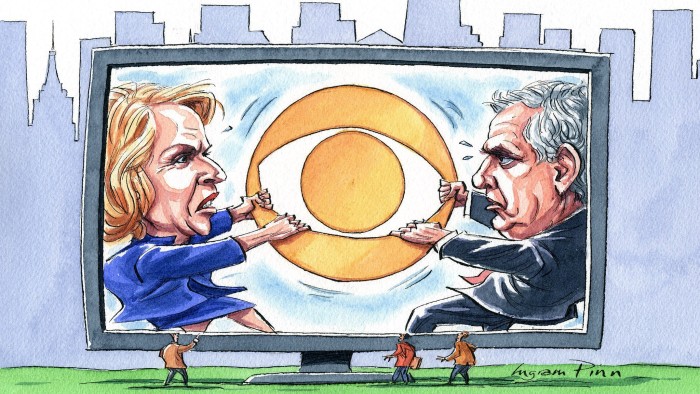Opinion today: The battle for CBS


This article is from today’s FT Opinion email. Sign up to receive a daily digest of the big issues straight to your inbox.
The US television network CBS, led by its chairman and chief executive Les Moonves, is locked in a legal battle in Delaware with Shari Redstone, heir to its sister company Viacom. The crux of the dispute is Ms Redstone’s desire to encourage a merger of the two companies. Mr Moonves is resisting.
The spectacle, writes John Gapper in his column, is not especially edifying. Not only does the case test the legitimacy of the two companies’ dual-class share structures, it also has sulphurous whiff of baby-boomer entitlement, John argues.
It is, furthermore, a sobering moment for proponents of dual-class share structures. The best argument for such arrangements is that they allow founders to run companies with longer-term outlooks than dispersed shareholders. The problem in this case is that Ms Redstone’s 94-year-old father Sumner was the founder; yet she wields his power.
America alone
Donald Trump has always made much of his mastery of the “art of the deal”. In foreign policy, however, he is revealing himself to be the master of the self-harming deal, writes Edward Luce. In trade talks with China and in negotiations with Kim Jong UN’s North Korea, Mr Trump is following a predictable pattern: threats followed by conciliation, followed by rage, followed by threats.
Like-minded
We have heard much in recent years about the politically and civically corrosive effects of social media. Yet, argues Anne-Marie Slaughter, there is an upside: anti-graft campaigners in a number of countries have used new technology to root out corruption and in some cases topple governments. Social media can help beleaguered citizens to feel that they are not alone, that they are not at the mercy of political forces beyond their control.
Rewriting history
Both China’s Xi Jinping and India’s Narendra Modi have sought to use history for domestic, highly nationalistic ends. Now, Jamil Anderlini writes, both men are embroiled in a struggle for ownership of the history of the Neolithic period.
Best of the rest
College does help the poor — Tim Bartik and Brad Hershbein in The New York Times
I had to go abroad to end my doomed pregnancy: Ireland needs legal abortion — Siobhan Donohue in The Guardian
How long can Nicolas Maduro hang on to power in Venezuela? — Jon Lee Anderson in the New Yorker
The obsession with Oxbridge elitism gives other British universities a free pass — Jason Murugesu in the New Statesman
The quiet success of the higher minimum wage — Conor D'Arcy in Prospect
What you’ve been saying
Letter from Paolo Quattrone:
Calls for the break-up of the Big Four accounting firms (“Carillion’s demise spurs call for action”, May 16) will not fix the audit function. It is no coincidence that cases of boards subjected to a rigorous cross-examination of their accounts at AGMs are rare. This can be changed by re-making accounting numbers matters of concern and challenge the assumption they are matters of fact. Figures should prompt scrutiny and tensions among the various stakeholders interested in the process in order to understand that there is no such a thing as an accounting truth but truth cannot be stretched too much. Therefore a debate about such figures has to happen. The higher the proportion of guesswork, the more readers should be empowered to look at them with a degree of positive scepticism.
Comment by Optimiste on Italy's new rules could shake the euro:
When the Greek tragedy unfolded, it was quite easy to perceive that Italy might be the next domino to fall. What have politicians in Brussels done in the meantime ? Almost nothing; as always, they kicked the can down the road hoping that the big crisis will be avoided. France, but most of all Germany, have tried to buy time as if they fundamentally were not interested any longer in the EZ. Today, Mr Le Maire and others can start balking but it seems to be quite late, damage has been done and will not be reverted swiftly.
Today’s opinion
FT Alphaville: Ripple altruistically donates $4m to celeb on daytime TV
The exorbitant cost of Trump’s America going it alone
Allies and adversaries are learning to sustain deals without the US
Graduating in Donald Trump’s age of illiberal democracy
Students who learnt to respect the truth join a society assaulted by alternative facts
China and India compete by twisting history
Revisionist claims of early civilisation seek to boost nationalist aims
Social media can help fight corruption one ‘like’ at a time
Success in mobilising public opinion against dishonest leaders offers lessons
Free Lunch: Taking back control of the internet
EU data rules rebalance power in the digital economy
The battle for CBS is old-fashioned entertainment
Les Moonves and Shari Redstone are acting like entitled baby boomers
The one airport in the world that puts a spring in my step
Singapore’s Changi has been voted the world’s best six years running — so why do I remember so little of it?
EM Squared: Tanking currencies are bad news all round
Currency wars give no edge to exporters but do cause economic harm
FT View
FT View: A wise autocrat knows what he does not control
Turkey’s president risks losing his fight with the financial markets
The Big Read
The Big Read: Malaysia: the obstacles to dismantling the old regime
New government must overcome scepticism to fulfil promises to curb corruption and introduce populist policies
Comments